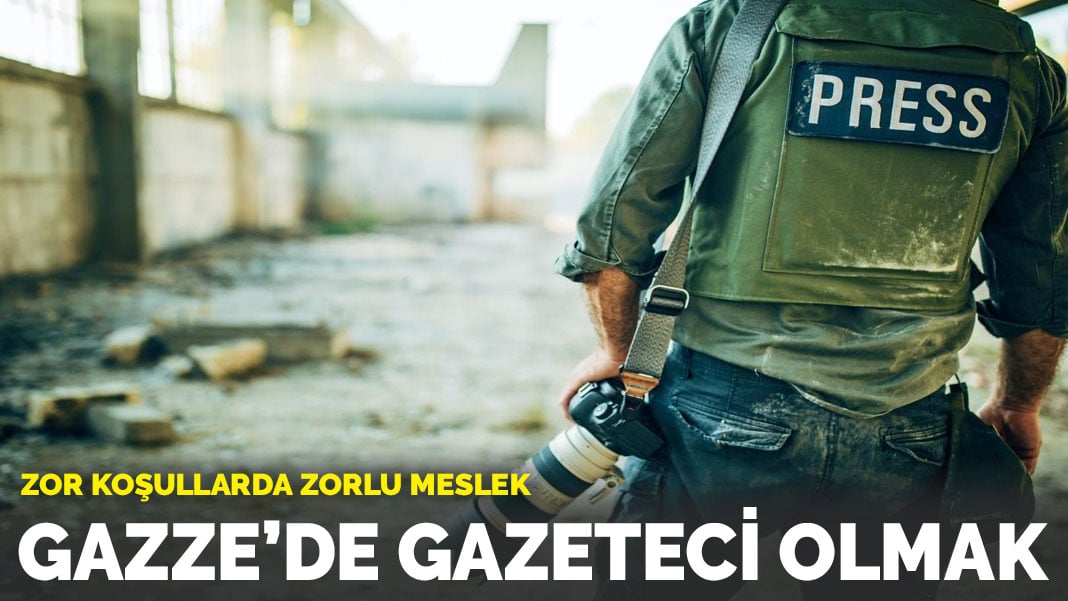Following the “Al-Aqsa Flood” operation, which began on October 7 under the leadership of Hamas, the Israeli army launched violent attacks on the Gaza Strip. While the number of Palestinians who died exceeded 8,000, a large percentage of those who lost their lives were children.
People in many parts of the world react intensely to Israeli attacks. On the other hand, journalists who report events in the region to the public are trying to practice their difficult profession under difficult circumstances. According to the latest shared data, 35 journalists lost their lives during the attacks.
Be a journalist in Gaza
Mahmoud Bassam, who works as a freelance journalist in Gaza, is worried about the situation of his wife and 11-month-old daughter, because they have to move constantly to avoid bombing. In other words, when he leaves his house in the morning, he does not know whether he will find them in the same place in the evening.
What happened will go down in history
BBC TurkishAccording to the news in Fergal Keane describes what happened from Jerusalem as follows:
Bassam firmly writes the pain of his people in history. In more than three weeks since the conflict began, he has toured hospitals, refugee camps and bomb sites.
Along with the BBC’s correspondent in Gaza, Rushdi Abu Al-Ouf, independent journalists like Bassam help the BBC tell the world about the suffering of civilians trapped in ongoing air strikes. When I reached him by phone after hours of effort, Bassam described the emotional impact of his work.
Sometimes I stop and cry
Bassam describes his experience with the following words: “Although it is difficult to watch what I see and try to convey this message, sometimes when I am behind the camera I stop and cry. The only thing I can do is remain silent.”
Journalists I know who work in war zones feel a deep sense of helplessness as people endure relentless suffering. With so many people needing help, how can you help? How do you do your job while delivering food and providing first aid?
We are not aid workers or medical workers, but we are human beings.
This situation becomes more painful with Bassam’s local relations. Foreign correspondents like me have the honor of boarding the plane and returning home. Although memories of war leave a mark, at least we and our loved ones have physical security.
He could always bump into someone he knew
The Gaza Strip is a very small place. The total area is 366 square kilometers. Bassam can always meet people he knows in the middle of the war. “I am a journalist and my job is to say what I see,” he says. “But sometimes I have to stop and sit with the kids, give them water, find out what their needs are, or meet those needs.”
As we watch Bassam’s raw footage on our computers, we are moved by his calm. Bassam never forgets that the people he interviewed during his photography were perhaps facing the camera for the first time in their lives, in the worst conditions imaginable.
What has been happening since October 7 is turning into one of the most dangerous wars on journalists in recent times. More than 30 journalists have been killed so far. The Committee to Protect Journalists says journalists working in Gaza are paying an unprecedented price.
A deadly period for journalists
“This is a deadly time for journalists in Gaza,” said Sherif Mansour, a Middle East expert at the Committee to Protect Journalists.
“We have seen more journalists killed in the last three weeks or so than in 21 years. Many journalists have lost colleagues and family homes and have been forced to flee to places where there is no safe shelter or way out.”
And in a tight-knit community of journalists in places like Gaza, the loss of their colleagues must be deeply felt. Yara Eid is a Palestinian journalist who grew up in Gaza. Yara currently lives in England and mourns her friend Ibrahim Lafi, who was killed at the beginning of the war.
I lost my best friend Ibrahim
“I lost my best friend, Ibrahim. He was a Palestinian journalist, but he wasn’t just a journalist. He was 21 years old. He was a brother. He was my best friend. He was a dreamer,” Yara says and continues. :
“He was a photographer, and he loved life very much. He was always the one who laughed the most. I have never seen Ibrahim who did not smile in my life. Whenever I saw him, he was the one who laughed the most.” The friend I had who supported me the most. “He had a lot of dreams and really wanted to become a photographer, and he chose to show the beauty of Gaza to the whole world.”
Journalists go to work in Gaza knowing that it is not only them who are under threat, but also their families. Al Jazeera correspondent Wael Al-Dahdouh lost his wife, son, daughter, and grandson in a recent Israeli air strike.
Wael Al-Dahdouh returned to work a day later, saying that it was his duty. For those of us watching from Jerusalem, this devotion is extraordinary.

